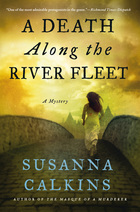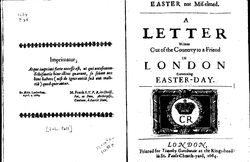 Probably one of the most frequently asked questions I get from people seeking to write historical fiction is this: How much research should I include in my historical novel? And my reply, which may sound more flippant than I intend, is just this: Enough to tell the story. I've written elsewhere about balancing historical accuracy and authenticity. So, I thought today I'd given an example of how I seek to have my characters interact with historical details, hopefully without just dumping my research on my readers. I could have picked any passage, but in honor of Easter, I picked an excerpt from my forthcoming novel, A DEATH ALONG THE RIVER FLEET. In this, scene Master Aubrey has just returned from selling pamphlets (unsuccessfully) on Maundy Thursday, (known in other parts of the world as "Holy Thursday.") There were a couple of factual details about Easter that I wanted to bring up in the scene. First, since the Middle Ages, there was a tradition in England that on Maundy Thursday, the monarch would give money to the poor and wash the feet of twelve poor people. [Indeed, while the etymology is not certain, the word "Maundy" may have come from the Latin world mendicare ("to beg.")] But we know from the diarist Samuel Pepys, in 1667, King Charles II opted against the practice that year, asking the Bishop of London to do it for him. Second, there had been an ongoing debate about the moveable date of Easter--some scholars of the time insisted that the date should be the same each year, similar to how Christmas was always on December 25. Third, in general, I wanted to allude to the fact that England was on a different calendar (the Julian Calendar) than Catholic nations like France and Italy, which had adopted the calendar created by Pope Gregory (the Gregorian Calendar). I couldn't use all the research I had at my fingertips, but I tried to work in a few of the more salient points within their trade as the printers and sellers of books. So you can see what details I managed to include...  John Pell, Easter not mis-timed (1664) Wing / 395:11 John Pell, Easter not mis-timed (1664) Wing / 395:11 Master Aubrey laid his pack down. “I sold a few. I went to Whitehall to see the King wash the feet of the poor people, but the Bishop of London did it on his behalf.” The printer seemed a bit disgruntled. It had long been the custom for the monarchs of England to wash the feet of twelve men and women, as Jesus had washed the feet of the Apostles before the Last Supper. Having the Bishop of London take on the task instead of the king clearly irked him. Sometimes Lucy suspected the printer had Leveller sensibilities and liked it when the royals took on more mundane responsibilities. “Which pieces did you bring?” Lucy asked, changing the subject. In truth, she was always intrigued to know how the packs got decided. Master Aubrey had a knack for knowing what to sell to attract a crowd that she desperately hoped to learn for herself one day. “Could not very well sell murder ballads and monstrous births on Maundy Thursday, hey? Brought along John Booker’s Tractatus paschalis and John Pell’s Easter Not Mis-Timed. Too many of them, it seems. Only the sinners’ journeys, like the one you wrote about that Quaker, sold today.” He kicked the still-full bag, looking in that moment a bit like Lach, causing Lucy to hide a smile. A rare miss for Master Aubrey. Most people did not care how the date of the moveable holy day was affixed in the almanacs each year. Nor did they care why Catholic nations celebrated Easter and Christmas on different days than they did in England. I'm sure some readers might think that I have provided too much detail here, and other people think I have not offered enough. But, for me, this was "enough to tell the story."
0 Comments
Leave a Reply. |
Susanna CalkinsHistorian. Mystery writer. Researcher. Teacher. Occasional blogger. Categories
All
Archives
May 2023
|
 RSS Feed
RSS Feed